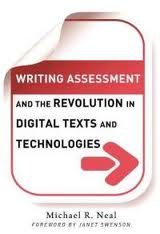Review Conversation
Neal concludes his text with an endearing tale of his six-year old daughter and her astute understanding of audience when she asks her father about finding a publisher for a collection of books she has written. This delightful anecdote is a fitting end for a text that is woven together with cogent arguments, supporting evidence, and pleasant stories about personal experiences inside and outside of academia. Ultimately, we are left with more questions than answers, mainly due to Neal posing such questions in the last pages of his text. I must say that I appreciate the queries; they fit well with Neal's critical analysis, pedagogy, and advocacy for students. His parting call to practitioners of composition is a call to a unique revolution. He writes, "by staying ahead of the technological curve, we can insert our voices and ideas into the development of new writing and assessment technologies that will propel us in directions we are only beginning to imagine in the discipline " (p. 133). As an emerging composition scholar, I appreciate his challenge and look forward to participating in these new directions.
